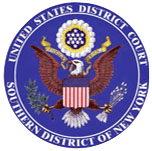Grokster Ltd. was a privately owned software company based in Nevis, West Indies that created the Grokster peer-to-peer file-sharing client in 2001 that utilized the FastTrack protocol. Grokster Ltd. was rendered extinct in late 2005 by the United States Supreme Court's decision in MGM Studios, Inc. v. Grokster, Ltd. The court ruled against Grokster's peer-to-peer file sharing program for computers running the Microsoft Windows operating system, effectively forcing the company to cease operations.
Infringement refers to the violation of a law or a right.
MGM Studios, Inc. v. Grokster, Ltd., 545 U.S. 913 (2005), is a United States Supreme Court decision in which the Court unanimously held that defendant peer-to-peer file sharing companies Grokster and Streamcast could be sued for inducing copyright infringement for acts taken in the course of marketing file sharing software. The plaintiffs were a consortium of 28 of the largest entertainment companies.
Secondary liability, or indirect infringement, arises when a party materially contributes to, facilitates, induces, or is otherwise responsible for directly infringing acts carried out by another party. The US has statutorily codified secondary liability rules for trademarks and patents, but for matters relating to copyright, this has solely been a product of case law developments. In other words, courts, rather than Congress, have been the primary developers of theories and policies concerning secondary liability.
Legal tests are various kinds of commonly applied methods of evaluation used to resolve matters of jurisprudence. In the context of a trial, a hearing, discovery, or other kinds of legal proceedings, the resolution of certain questions of fact or law may hinge on the application of one or more legal tests.
In the United States, a valid patent provides its proprietor with the right to exclude others from practicing the invention claimed in that patent. A person who practices that invention without the permission of the patent holder infringes that patent.
Sony Corp. of America v. Universal City Studios, Inc., 464 U.S. 417 (1984), also known as the “Betamax case”, is a decision by the Supreme Court of the United States which ruled that the making of individual copies of complete television shows for purposes of time shifting does not constitute copyright infringement, but is fair use. The Court also ruled that the manufacturers of home video recording devices, such as Betamax or other VCRs, cannot be liable for infringement. The case was a boon to the home video market, as it created a legal safe haven for the technology.

Copyright infringement is the use of works protected by copyright law without permission, infringing certain exclusive rights granted to the copyright holder, such as the right to reproduce, distribute, display or perform the protected work, or to make derivative works. The copyright holder is typically the work's creator, or a publisher or other business to whom copyright has been assigned. Copyright holders routinely invoke legal and technological measures to prevent and penalize copyright infringement.
Perfect 10, Inc. v. Visa Int'l Serv. Ass'n is a court case in which the pornography magazine Perfect 10 filed a complaint against Visa and MasterCard for copyright infringement and trademark infringement.

Hotfile was a one-click file hosting website founded by Hotfile Corp in 2006 in Panama City, Panama. On December 4, 2013, Hotfile ceased all operations, the same day as signing a $4 million settlement with the Motion Picture Association of America (MPAA); the settlement had previously been misreported as $80 million.

Arista Records LLC v. Lime Group LLC, 715 F. Supp. 2d 481, is a United States district court case in which the Southern District of New York held that Lime Group LLC, the defendant, induced copyright infringement with its peer-to-peer file sharing software, LimeWire. The court issued a permanent injunction to shut it down. The lawsuit is a part of a larger campaign against piracy by the Recording Industry Association of America (RIAA).

British Telecommunications plc v. Prodigy Communications Corp. was a patent infringement case which determined whether a patent related to communications between central computers and their clients was infringed by Internet service providers through hyperlinks. Judge Colleen McMahon of the United States District Court for the Southern District of New York ruled that Prodigy Communications Corporation had not infringed the patent held by British Telecommunications plc through its use of hyperlinks. On summary judgment, McMahon held that there were substantial differences between British Telecommunications' patent and the method of operation of the Internet. The decision limited patent protection for Internet service providers' use of hyperlinks, protecting the providers from licensing fees related to this integral part of Internet technology.
Once an invention is patented in Canada, exclusive rights are granted to the patent holder as defined by s.42 of the Patent Act. Any interference with the patent holder's "full enjoyment of the monopoly granted by the patent" is considered a patent infringement. Making, constructing, using, or selling a patented invention without the patent holder's permission can constitute infringement. Possession of a patented object, use of a patented object in a process, and inducement or procurement of an infringement may also, in some cases, count as infringement.

Columbia Pictures Industries, Inc. v. Fung 710 F.3d 1020 No. 10-55946, was a United States Court of Appeals for the Ninth Circuit case in which seven film studios including Columbia Pictures Industries, Inc., Disney and Twentieth Century Fox sued Gary Fung, the owner of isoHunt Web Technologies, Inc., for contributory infringement of their copyrighted works. The panel affirmed in part and vacated in part the decision of United States District Court for the Central District of California that the services and websites offered by isoHunt Web Technologies allowed third parties to download infringing copies of Columbia's works. Ultimately, Fung had "red flag knowledge" of the infringing activity on his systems, and therefore IsoHunt was held ineligible for the Digital Millennium Copyright Act § 512(c) safe harbor.
Akamai Technologies, Inc. v. Limelight Networks, Inc., 797 F.3d 1020, is a 2015 en banc decision of the United States Court of Appeals for the Federal Circuit, on remand from a 2014 decision of the U.S. Supreme Court reversing a previous Federal Circuit decision in the case. This is the most recent in a string of decisions in the case that concern the proper legal standard for determining patent infringement liability when multiple actors are involved in carrying out the claimed infringement of a method patent and no single accused infringer has performed all of the steps. In the 2015 remand decision, the Federal Circuit expanded the scope of vicarious liability in such cases, holding that one actor could be held liable for the acts of another actor "when an alleged infringer conditions participation in an activity or receipt of a benefit upon performance of a step or steps of a patented method and establishes the manner or timing of that performance." In addition, the court held that where multiple "actors form a joint enterprise, all can be charged with the acts of the other[s], rendering each liable for the steps performed by the other[s] as if each is a single actor."
Contributory copyright infringement is a way of imposing secondary liability for infringement of a copyright. It is a means by which a person may be held liable for copyright infringement even though he or she did not directly engage in the infringing activity. In the United States, the Copyright Act does not itself impose liability for contributory infringement expressly. It is one of the two forms of secondary liability apart from 'vicarious liability'.
Contributory infringement is understood to be a form of infringement in which a person is not directly violating a copyright but, induces or authorises another person to directly infringe the copyright.





